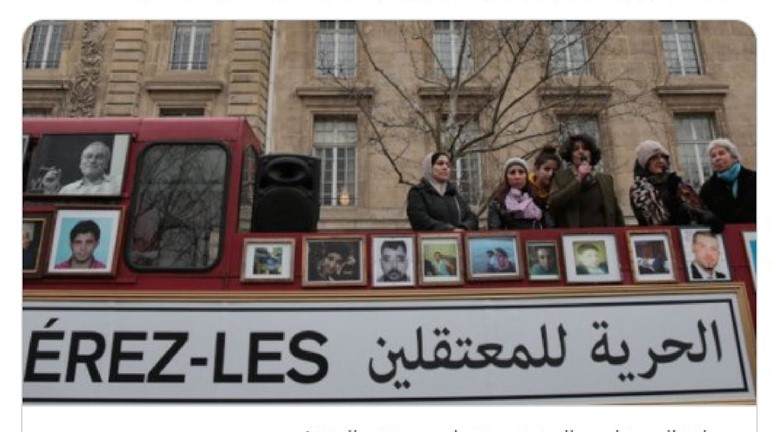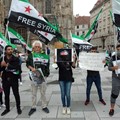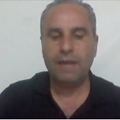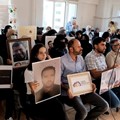On the International Day of Victims of Enforced Disappearance
Human rights professor Nora Ghazi, Executive Director of NoPhotozone, sheds light on the wives of detainees and disappeared refugees in Lebanon, and talks with them about the concept of justice and some of the daily fears and challenges they face due to the disappearance of their husbands. I still remember the day when everyone called me crazy when I apologized for going to Britain to study my masters after I got a full scholarship from the British Foreign Office, which was a dream for everyone. I decided to stay in Lebanon at a time when most Syrians are seeking to leave Lebanon by any means, and this was in order to establish the Novotozone organization, my joint dream with Basil, also at a time when the restrictions on civil society organizations in Lebanon and the donors began. It started as the end of many activists and organizations in Lebanon began, I thought I was related to living in Beirut because it is close to Syria and because I could see my family. Now, more than three and a half years have passed since I forcibly left Syria, and more than a year and a half has passed since the last time I saw my family due to the travel difficulties after the Corona pandemic, and the complete collapse of Lebanon on all levels, I still find it difficult to leave Beirut. What keeps me here are the women with whom I work on a daily basis as beneficiaries of Nophotozone, as I feel I belong to this society, which I will specifically call the society of the wives of detainees and the disappeared. It is not only belonging that keeps me going despite all the difficulties, but the sense of responsibility towards women who are left behind and marginalized. The world sees well only refugee women in Europe, despite the tragedy of hundreds of thousands of refugees in Lebanon and the Middle East, those who were not fortunate enough to obtain asylum in a country that respects human beings, particularly women children, especially women who suffer from the experience of arrest and disappearance that they have been subjected to personally Or a member of their family was exposed to it. I am in contact with many women in Lebanon whose sufferings are similar, but I chose four women to talk to each of them about the concept of justice, their daily suffering and fears, and their emotional lives. My interviews with the participating women began by asking me what justice means to them. Yasmine, a 47-year-old woman from Damascus, mother of six children between 13 and 23 years old, whose husband has been missing since 2013, said she recently learned that he had died in a detention center without confirming this or obtaining any indication: “Justice in the first place is to know what happened to our men, their fate, their whereabouts, why they are hidden. To obtain our rights as women, as refugees in a country that suffers greatly and suffers with it all its concerns, in addition to the racism that is practiced against us daily; We want just laws that protect us. We want justification, recognition, and apology for all the crimes committed against us, including forced displacement and enforced disappearance of our husbands. I want my sons and daughters to learn like other boys.” She repeats the word justice and laughs, saying: “There is no justice, I had doubts about this before the revolution and now I am sure.” She added: "We do not even have the right to express our opinion, even here in Lebanon we do not feel safe because the Syrian regime and its allies have a presence here in one way or another." As for Habiba, a 40-year-old woman from Homs and a mother of five children between 11 and 22 years old, the eldest of whom was killed by a shell in 2012 when he was fifteen, and her husband was forcibly disappeared in 2012, she says: “Justice is a very big concept, and it primarily means equality in everything, rights and duties, work, and expression of opinion.” Habiba agrees with Yasmine about the lack of justice at the present time: “Where is justice, and I am currently playing the role of father and mother and bear all responsibilities alone, even my feelings that I cannot express so as not to bother anyone and not be judged by the family and society.” Raghad, a 37-year-old from the southern countryside of Damascus and a mother of five children, between the ages of 8 and 18, her husband has been missing since 2014, and recently she obtained a divorce in absentia and married another man. She suffers a lot now because of her new marriage, in addition to all her suffering and waiting for her husband for years without any hope, so she sees that justice is in the absence of injustice, and this injustice is practiced against women not by the system alone that hid their men, but by society and the family. Raghad believes that justice “is that humanity is our priority, that we feel for each other, and that women are left free to make decisions about their lives, and no one is responsible for the woman, her life and her choices.” It considers that the wife of the missing person is the one who has suffered the most in this conflict at all levels, and to achieve the minimum level of justice it is necessary to restore rights to their owners and compensate all victims. We come to Amal, a 45-year-old woman from Qaboun in Damascus, and a mother of four children, 3 boys and a girl, between 10 and 27 years old. Her eldest son disappeared when he was 18 years old, accompanied by his father (her husband) in 2012. Amal agrees with other women that justice means “equality, especially between women and men, Syrians and Lebanese, between the rich and the poor.” It also affirms that domestic violence must be eliminated by analyzing and treating its causes, and primarily single mothers must be supported. Amal moves to the second point and talks about the difficulties she experiences every day, the most important of which is waiting in vain, and the daily worry about the fate of her husband and son. Of course, she wishes that this would be her only concern, but she has to worry about daily life matters, especially with the collapse of the situation in Lebanon. She has a constant fear of not being able to secure the rent for the house or the price of food, and the fear of being evicted from the house or being deported from Lebanon. Raghad suffers from the same daily fears, in addition to having to work and the difficulties of finding work in Lebanon, especially for an uneducated Syrian woman, and this prompted her to accept a low wage. She used to spend all her day at work, and return home in the evening, not to rest, but to do the housework and take care of the children.
Her health condition prevented her from working recently, and this was one of the most important reasons that prompted her to remarry, especially after she lost hope of her ex-husband's return. Habiba believes that the daily suffering is not only, as Raghad said, in terms of the difficulty of finding work, but also “in the situation of society that watches and judges us as single wives.” “We are subjected to various types of sexual harassment and blackmail, and everyone covets us, and we do not feel that civil society organizations are offering us or our children anything because of our inability to prove the death of the breadwinner who is the father as a result of his enforced disappearance and the failure of the authorities to recognize his fate, and this makes us and our children deprived of most ways Support from organizations,” Habiba added. After confirming that she is experiencing the same suffering, Yasmine adds to what her colleagues said that those who benefit from support often benefit on the basis of favoritism and non-professional personal relationships practiced by most organizations. “Everything is from water to electricity to bread,” says Yasmine, pitying her sons and daughters who have been deprived of their childhood and youth while they work and bear great responsibilities and have not completed their education. She also complains about the United Nations High Commissioner for Refugees, which allocates per capita refugee only 6 dollars per month. All the women sighed when asked what if the husband still existed, and they all affirmed that all this would not have happened; The husband will be responsible for them and their children, and they will not have to work in these harsh and humiliating conditions and be subjected to exploitation and extortion; Perhaps they were in another country, or their children completed their education, and they felt safe because they had a bond, and when they and their daughters were harassed. Raghad, for example, did not think of getting married again and suffered from what she is suffering now, she said; Habiba would have felt that there was a tender chest to lean on, and she would have played her role as a mother only inside the house, as she put it. Amal says, “People think that my son’s disappearance is more difficult than my husband’s, but I assure you the opposite. My husband’s absence broke me and my children. If he was present, he would have relieved me of my grief over my son’s disappearance.” This is also confirmed by Habiba that her husband's absence broke her back and she did not find a helper for her when her son was killed. The women welcomed the question about their personal and emotional lives as females and stressed that it is very important to talk about this issue and not be ashamed to reveal it, especially since we suffer a lot in this regard and find no one to help us. Yasmine begins to complain that her life as a female has been completely canceled; She only feels that she is a mother, but she suffers a lot when her emotional needs begin to appear and she tries to suppress them, and these needs did not appear during the first three years of her husband's disappearance; But then she started living it badly, and this hurts her. Even if she wanted to enter into a relationship with a man, she could not do that because she was afraid of religion and society, and she often would not trust the man with whom she would establish a relationship that he would not tell anyone, in addition to that she is 47 years old. Who will want her, according to her, and she says that the only framework for any relationship is marriage, and she does not want to marry again. Habiba is trying to compensate for her emotional deprivation by participating in relaxation sessions and emptying myself whenever she has the opportunity, and says that she refuses to marry again because she loves her husband and cannot be emotionally with a man and physically with another man. She is a believer and pious and will not engage in an illegal relationship, as she puts it. Like Yasmina, she often will not trust the other party if she has an affair; She also says that the marital relationship is very important for the stability and psychological balance of women. “Imagine our suffering, and this is yet another injustice against us and a major violation of our rights as women, and no one feels us, even our family and children,” Habiba added. Raghad said that at first she lost her sense of femininity so that she did not look at herself in the mirror; But two years ago, a man appeared in her life, her cousin, and restored her sense of femininity; And because she does not want the forbidden, according to her expression, she resorted to a lawsuit to separate her in absence and recently married, and she is now suffering from the family of her ex-husband, which rejected her new marriage and threatens that she will take her children and even the household items from her, and the boys, particularly the girls, are not satisfied with her marriage even though she does not want to give up about them. It is worth noting that she is the second wife, as he is married and has children, but this is the only option she has, and she confirms that her marriage was not only because of her emotional needs, but primarily because she wants to protect her and her children from an economic and social point of view. As for Amal, she says that she does not think about her needs as a female at all, and basically she will not be able to satisfy her outside the framework of another marriage, and this is what she will not do, especially with her grief for her disappeared son, and she thinks that it is good for her that she does not think of herself as a female, for this is better than to live the torment of deprivation every moment without Feasible, especially in this society and given that she has seen that most of her remarried friends are not happy. I listened to the women projecting their experiences onto what I am currently experiencing, which in many ways contradicts their tragedy; I have no children with Basil, and this somehow leads to me constantly being asked by my surroundings to turn the last page of their opinion of my story with Basil and start a new one with another man. Perhaps I want to start over, but without turning any page of my story with Basil, and I know perfectly well that this is strange and perhaps unacceptable, but Basil for me is an issue, and issues remain in the present and the future and never turn into a memory and a past; I do not feel that I am able to continuously explain, explain and justify to everyone who tells me that I should not exaggerate in mentioning Basil, and I often end the useless talk by asking: If it was my disappeared brother (God forbid) you would ask me not to mention it? Silence comes as an eloquent answer.
At the end of the interviews, all the women emphasized that special attention should be given to the wives of detainees and the disappeared, especially in Lebanon, by supporters and those concerned with the Syrian file, in addition to the media. Giving special attention to psychological and social support and rehabilitation for them and their children. They also stressed that the priority in the paths of justice should be to fully reveal the truth with all evidence and evidence, and to secure special protection for them and ensure that they are not deported; The situation in Syria is not safe, especially for them, because they are subject to arrest with their children, and they need compensation and reparation for everything they have gone through, especially with society's stigmatization of them as lonely women. They must be freed from the pressure and siege of society, they must know their status whether they are widowed or married, they must be treated as human beings and as women and not just as mothers.
I note that I replaced the women's names with pseudonyms at their request, in order to preserve their safety and privacy.





